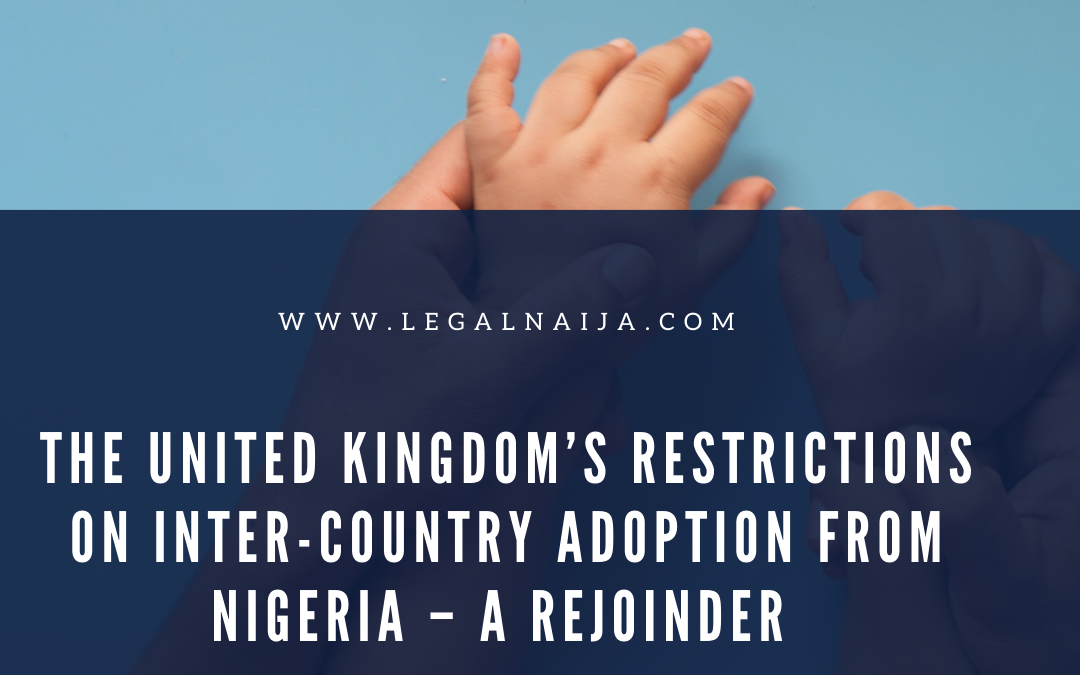The UK Department for Education recently published the “Adoption: Restricted List” which includes the segment entitled “Nigeria: Special Restrictions on Adoptions from Abroad (Nigeria) Order 2021”. By virtue of the Order, adoptions from Nigeria to the UK were suspended with effect from 12th March, 2021.
As an adoption agency with expertise and extensive experience in inter-country adoptions from Nigeria since 2006, working in partnership with Lagos and Anambra States, we feel constrained to address the issues raised in the said circular, using Lagos state, (which has similar processes to those of Anambra state) as a reference point, to provide clarity and set the records straight.
Background
- Adoption in Nigeria is a matter of state and not federal law. This means that every state has its own adoption law, procedure and practice which may differ significantly from those applicable in other states.
- Adoption in Lagos state is a subject of the Child’s Right’s law 2007 as amended in 2015. By this law, Lagos state could be said to have domesticated the provisions of the United Nations Convention on the Rights of the Child even though Nigeria is not a party to the Hague convention. Indeed, it is an aberration to make reference to “the Nigerian adoption system” as this does not exist. Since adoption is a matter of state law, the adoption system in each state, stands and falls on its own merits.
Responses to Concerns of the UK Government
- Difficulty in confirming the background and adoptability of the children and unreliable documentation
The background of each child proposed for adoption is firmly established by a robust, formal method requiring various administrative documents and involving a transparent investigation process. This results in the establishment of the child’s adoptability by the Ministry of Youth and Social Development (MYSD). Furthermore, the adoption process is facilitated by categorized procedures for both local and inter-country adoptions. For the purpose of this article, we have provided below, the Adoption procedure for Nigerians living abroad and Adoption Documentation
- Adoption procedure for Nigerians living abroad (As published by MYSD):
- Submission of Application Letter to the Permanent Secretary, Ministry of Youth and Social Development, Block 18, Secretariat, Alausa, Lagos
- Submission of all required documents by prospective adopters or through Foundation (including Home Study Report and Approval Letter from Country of Domicile by appropriate Authorities
- Administrative Processing by the Adoption Unit
- Payment of N130,000 Administrative fees
- Processing of all documents submitted for Honourable Commissioner’s Approval
- Collection of Approval Letter by the Prospective Adopters/Foundation
- Notification of Arrival of Prospective Adopters after a successful matching of child/children at a registered orphanage
- Invitation of Prospective Adopters with their updated documents through the foundation for the release of child/children for Bonding
- Conducting Bonding Assessment
- Interview with the Director, Social Welfare
- Legalization of the Adoption at the Family Court
- Adoption Documentation
Below is the comprehensive list of documents pertaining to the prospective adoptee, used for processing international adoptions in Lagos state:
- Social Report
- Laboratory Test result
- Medical Report
- Police Report
- Clearance Letter
- Approval Letter for Adopters
- Release Letter
- Approval for Legalization
- Court Order
- Birth Certificate
- Authority to travel abroad
- Ministry’s Statement of consent
- Letter to Passport Office pertaining to application for subject’s passport
The entire adoption process from commencement to completion lasts a minimum of one year from the date of application. According to Section 121 Child’s Rights Law,
“an adoption order must not be granted in respect of a child unless…the applicant has at least twelve months before the granting of the order, informed the social welfare officer of his intention to adopt the child.”
In practice, this one year period may be abridged by the Family Court judge in exceptional circumstances if the court considers that it is in the best interest of the child.
- Concerns about corruption in the Nigerian adoption system
From the Lagos state adoption procedure and documentation highlighted above, it would be observed that the adoption process involves four separate authorities. Each authority conducts its own independent investigations before issuing any related report or document. They are:
- The Nigeria police
- The Adoption Unit, Ministry of Youth and Social Development
- The Family Court
- The Nigeria Immigration Service. (By virtue of executive directive, every Nigerian child who has been adopted must apply for a Nigerian passport exclusively through the Nigeria Immigration Service headquarters, Abuja for proper monitoring and control).
- Evidence of organized child trafficking within Nigeria.
No doubt, organized child trafficking has been found to occur in some states within Nigeria. But the above points demonstrate that such occurrence is outside the scope of formal adoptions. Trafficking is illegal while adoption is legal. Hence a trafficked child cannot fall within the purview of the adoption process.
Conclusion
All considered, our response to the concerns raised shows that the Lagos state adoption system, largely mirrored by that of Anambra state, reflects international best practices. Every adoption case is thoroughly investigated and supported by extensive and reliable documentation, particularly those confirming the background and adoptability of the child. This is in addition to a series of checks and balances aimed at avoiding corruption and advancing the best interest of every child subjected to the adoption process.
Literacy Integration & Formal Education Foundation is a Not-for-profit, Non-governmental, child/women-focused organization with headquarters in Lagos. It also acts as an adoption agency aiming to advance the interests of orphans living in institutions, by integrating them into a family.
Elvira Salleras, President, Literacy Integration & Formal Education Foundation
And
Ibrahim Saka, Programme Officer, Literacy Integration & Formal Education Foundation

